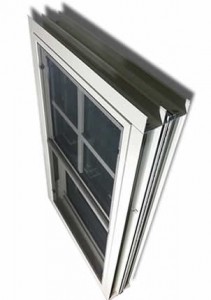Aluminum Replacement Windows
Although windows with aluminum frames can not be as energy efficient as Vinyl or Wood framed windows, that doesn’t mean that they must be entirely energy inefficient.
inefficient.
Some Aluminum framed windows come very close to being Energy Star Rated by manufacturing their aluminum frames with a “thermal break” that prevents the outside aluminum from conducting all the way through the frame.
Advantages of Aluminum Replacement Windows
Because Aluminum is a rigid building material, it is possible to build extremely strong frames with a reletively small amount of material. Meaning, Aluminum Replacement Window Frames are usually more narrow than that of Vinyl or Wood Frames. This allows for a larger viewing area (more glass and less frame).
Disadvantages of Aluminum Replacement Windows
Rigid Frames: Homes in the Dallas / Ft Worth area and throughout North Texas are often built on clay. Movement is almost inevitable. Aluminum replacement window frames do not flex or adapt to the movement of a North Texas home without affecting the way the window operates. The movement of a home (because of drought, heavy rains or foundation issues) can pull Aluminum window frames out of square and cause the movable window sash to stick or to not open at all.
- Condensation: Metal framed windows sweat in the winter because when warm (moist) interior air cools rapidly against cold window frames it contracts and releases moisture. This problem can be solved by manufacturing the window with a polyurethane barrier that separates the exterior (cold) aluminum frame from the interior (warm) aluminum frame. Unfortunately, this process adds considerable cost to the window but those costs are reimbursed over time through lowered utility bills.
- Life span: More than windows with Vinyl frames, those with Aluminum frames have an expiration date. Once an aluminum window frame moves too much, repair is almost impossible.
- Maintenance: Aluminum windows fade over time.
- Necessary Glass Replacement: It is common for exterior Aluminum frames to heat to temperatures that break down the silicone that binds the glass to the frame. Each day, the silicone heats up and each evening when the temperatures fall, the silicone re-congeals. This process repeats day after day, until the silicone seal fails. When this happens, the glass becomes cloudy with moisture and needs to be replaced.

